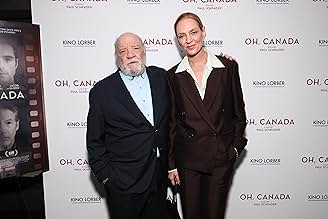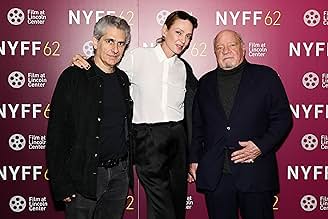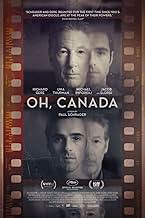Leonard Fife, einer von sechzigtausend Wehrdienstverweigerern und Deserteuren, die nach Kanada geflohen sind, um nicht in Vietnam zu dienen, teilt alle seine Geheimnisse, um sein mythologisi... Alles lesenLeonard Fife, einer von sechzigtausend Wehrdienstverweigerern und Deserteuren, die nach Kanada geflohen sind, um nicht in Vietnam zu dienen, teilt alle seine Geheimnisse, um sein mythologisiertes Leben zu entmythologisieren.Leonard Fife, einer von sechzigtausend Wehrdienstverweigerern und Deserteuren, die nach Kanada geflohen sind, um nicht in Vietnam zu dienen, teilt alle seine Geheimnisse, um sein mythologisiertes Leben zu entmythologisieren.
- Auszeichnungen
- 2 Nominierungen insgesamt
Handlung
WUSSTEST DU SCHON:
- WissenswertesBased on the novel 'Foregone' by Russell Banks. This marks the second time that Paul Schrader has directed one of Banks' novels for the screen, following his adaptation of Der Gejagte (1997).
- VerbindungenReferenced in Film Junk Podcast: Episode 961: In a Violent Nature + TIFF 2024 (2024)
Ausgewählte Rezension
Richard Gere is a respected maker of hard-hitting, muckraking documentary films. He works with his wife and producer, Uma Thurman. Many years ago he fled from the United States in protest over the Viet Nam War. Now it is 2023, he is dying, and several students of his are making a documentary, interviewing him over the protests and under the watchful eye of his producer and wife, Uma Thurman.
Schrader is a careful writer, and there are several ways to interpret this movie. Certain critics have called it "autobiographical" because they are so intellectually lazy that they can't be bothered to think more than one thought before they give up. There may be autobiographical points to this movie. Certainly the movie reflect Schraeder's opinions, rather, than say, a panda bear's, or those of a large lump of rock scraped down from the Laurentian Shield into the terminal morrain of Long Island. That, I believe, doesn't make it autobiographical, nor does the fact that the guy is a film maker. There are film makers and film makers. Even though Gere and the folks making the film-within-the-film want to make a sensational film no matter what the cost, Miss Thurman's only wish is to protect her husband, even though she already knows the worst.
I did consider whether this was a meditation on film making itself. It certainly has aspects of that. A film maker will shoot many more feet of film than he winds up needing, and edits it into a final form that may or may not bear any relationship to reality or the film maker's original intentions. As Gere dies on camera and over the course of the movie, the events of his life that he wishes to tell come up confused and mishappen, conflating and confabulating with each other. To make sense of that, to make a movie of that -- for the guys within the film already have a contract to sell the film -- will require an editor. That is the true work of any story teller: to arrange events and characters within a story, so that it makes sense to the audience.
But more central to understanding this film is to see that, like others in Schraeder's body of work, it is primarily concerned with outrage. In some ways his work resembles that of Ingmar Bergman: raised religiously, he pondered human fallibility in a world with no G*d to lend an objective framework of right and wrong: puzzlement and disappointment, leaving the audience the question of how to work out a system of morality. Schraeder, on the other hand, seems outraged, filled with despair, and leaving the mess to be cleaned up by the unfortunate survivors. Gere leaves the film makers to make sense of his interview, and Miss Thurman to clean up the mess and lies he has made of his life. It's not Gere's problem: he's dead. And it's not Schraeder's.
Anyway, those are a couple of the ways of viewing the film that I came up with. If you see the movie, despite the fact there's not an explosion or a good joke on view, let me know if they make sense to you. And if you have any interpretations that are different, too.
Schrader is a careful writer, and there are several ways to interpret this movie. Certain critics have called it "autobiographical" because they are so intellectually lazy that they can't be bothered to think more than one thought before they give up. There may be autobiographical points to this movie. Certainly the movie reflect Schraeder's opinions, rather, than say, a panda bear's, or those of a large lump of rock scraped down from the Laurentian Shield into the terminal morrain of Long Island. That, I believe, doesn't make it autobiographical, nor does the fact that the guy is a film maker. There are film makers and film makers. Even though Gere and the folks making the film-within-the-film want to make a sensational film no matter what the cost, Miss Thurman's only wish is to protect her husband, even though she already knows the worst.
I did consider whether this was a meditation on film making itself. It certainly has aspects of that. A film maker will shoot many more feet of film than he winds up needing, and edits it into a final form that may or may not bear any relationship to reality or the film maker's original intentions. As Gere dies on camera and over the course of the movie, the events of his life that he wishes to tell come up confused and mishappen, conflating and confabulating with each other. To make sense of that, to make a movie of that -- for the guys within the film already have a contract to sell the film -- will require an editor. That is the true work of any story teller: to arrange events and characters within a story, so that it makes sense to the audience.
But more central to understanding this film is to see that, like others in Schraeder's body of work, it is primarily concerned with outrage. In some ways his work resembles that of Ingmar Bergman: raised religiously, he pondered human fallibility in a world with no G*d to lend an objective framework of right and wrong: puzzlement and disappointment, leaving the audience the question of how to work out a system of morality. Schraeder, on the other hand, seems outraged, filled with despair, and leaving the mess to be cleaned up by the unfortunate survivors. Gere leaves the film makers to make sense of his interview, and Miss Thurman to clean up the mess and lies he has made of his life. It's not Gere's problem: he's dead. And it's not Schraeder's.
Anyway, those are a couple of the ways of viewing the film that I came up with. If you see the movie, despite the fact there's not an explosion or a good joke on view, let me know if they make sense to you. And if you have any interpretations that are different, too.
Top-Auswahl
Melde dich zum Bewerten an und greife auf die Watchlist für personalisierte Empfehlungen zu.
Details
- Erscheinungsdatum
- Herkunftsländer
- Sprache
- Auch bekannt als
- Oh, Canada
- Drehorte
- Harriman, New York, USA(The scene that was filmed here is supposed to be a scene where the character played by Jacob Elordi, crosses over into Canada.)
- Produktionsfirmen
- Weitere beteiligte Unternehmen bei IMDbPro anzeigen
Box Office
- Bruttoertrag in den USA und Kanada
- 136.042 $
- Eröffnungswochenende in den USA und in Kanada
- 31.869 $
- 8. Dez. 2024
- Weltweiter Bruttoertrag
- 136.042 $
- Laufzeit1 Stunde 31 Minuten
- Farbe
- Sound-Mix
Zu dieser Seite beitragen
Bearbeitung vorschlagen oder fehlenden Inhalt hinzufügen








































